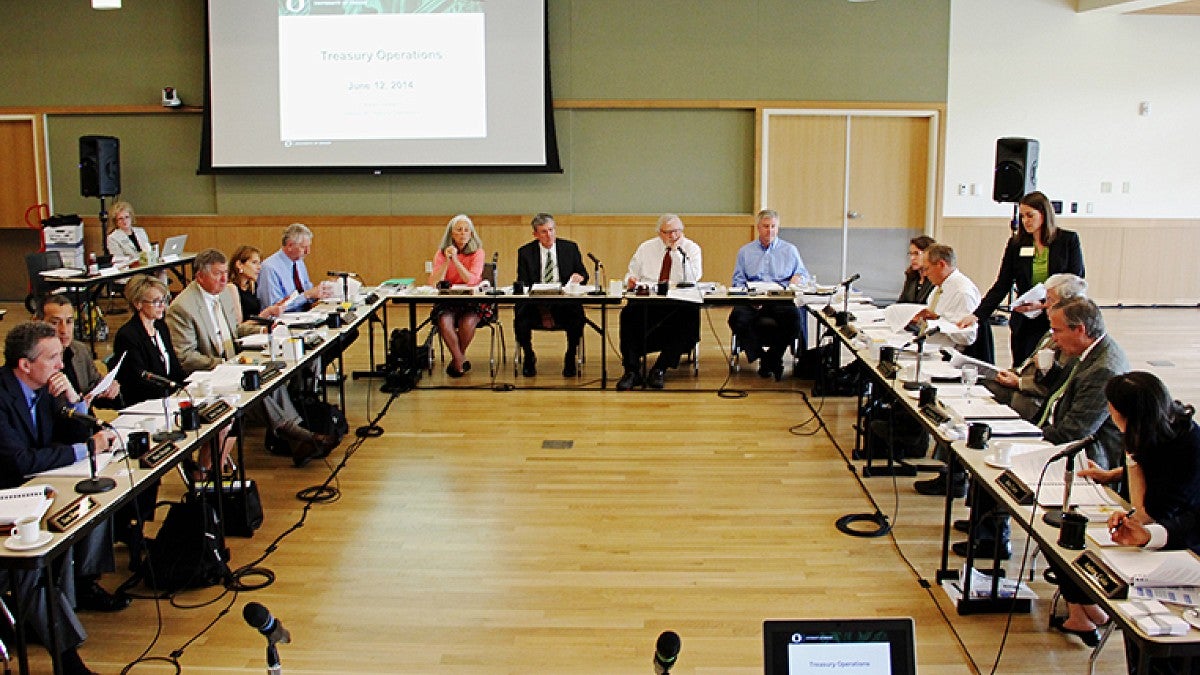During the second day of its final full meeting before assuming governance of the University of Oregon, the Board of Trustees heard about cluster hiring, enhancing student experiences and a billion dollar fundraising aspiration.
The president, provost and advancement vice president discussed strategic planning and garnering resources needed to build programs, support students, and attract and retain the best faculty in the world.
First, Pres. Michael Gottfredson spoke candidly to the trustees about the issue of sexual violence. He told the board that he shares their concern about the recent report of sexual misconduct.
“I am angry that there are students who have experienced sexual violence, and students who don’t feel safe,” said Gottfredson. “This is unacceptable. We have the opportunity to move forward.”
The president outlined the practices the university takes in all misconduct cases to immediately provide support to students, to cooperate with law enforcement and to meet federal civil rights and privacy responsibilities.
Gottfredson also talked about the review panel that will examine academic, athletic and conduct issues related to the university’s prevention and response to sexual misconduct. He encouraged the board to ask questions and help advance the campuswide and national dialogue about sexual assault.
ASUO President Sam Dotters-Katz, the student representative trustee, said there was a lot of pressure on the administration to violate students’ rights, but they stood fast and he appreciated that.
“Anyone who says this president, the athletic director or anyone else in the administration cares more about winning basketball games than student safety is flat out wrong,” said Dotters-Katz. “There is no other way to put it.” He warned that if the campus doesn’t come together, the efforts to make improvements would stall.
The rest of the board meeting focused on the task ahead of building the UO into a premier public residential research university.
Clusters of Excellence Hiring
Senior Vice President and Provost Scott Coltrane shared the 10 proposals selected for the Clusters of Excellence Faculty Hiring Initiative. The program is designed to build on academic success already on campus, and selectively build programs through targeted hiring. The provost told the board that he had received a letter of dissatisfaction from some faculty members about the focus on sciences and lack of representation from humanities and other disciplines. He said he would work with those faculty members and stressed that many of the proposals not selected in the top 10 could still be funded in other ways. Overall, the provost said the faculty seemed very excited about the process.
“We have huge faculty buy-in because they realize that in order for us to be competitive… we need to get in the game,” said Coltrane.
Some trustees asked if programs are being added, would other programs be cut. The provost stressed that they would conduct the normal review process of programs, but they did not want to abandon the university’s broad liberal arts approach.
Board Chair Chuck Lillis echoed that and said, “We don’t want to give up our important role as a comprehensive university.”
Raising awareness and funding
The board then focused on the university’s aspirations to increase awareness and raise money for the university.
Associate Vice President Tim Clevenger talked about hiring a firm to help tell the UO’s story. 160over90 will help to highlight the academic strengths of faculty and researchers, and build on the UO’s positive athletic brand.
“We are able to finally, boldly, creatively tell that story,” said Clevenger. “What makes us unique and special, that’s the focus. We want to talk about community and the place where we live here.”
Vice President for Advancement Mike Andreasen then outlined the goals of the upcoming public campaign. He explained that during the four “quiet” years of the campaign, development has already raised nearly $600 million dollars. In the recent past about half of donors' money went to academics, but this year that portion for academics grew to two-thirds. Donors to the UO have contributed more than $100 million a year for eight consecutive years.
Andreasen said the public campaign is expected to launch in fall. It will focus on two primary areas:
- Scholarship for Oregon residents
- Focused areas of academic excellence cluster hire initiative
He did not reveal the financial goal for the campaign but said when you look at the opportunities on campus, it is more than a billion dollar agenda.
“We know the needs of the campus and our aspirations,” said Andreasen. “As we look at the collective aspirations next fall, we will then declare our goal. It will be bold and exciting.”
Trustee Connie Ballmer asked, “Will a large campaign hurt our ability to get state dollars?”
Gottfredson and Associate Vice President for State Affairs Hans Bernard told the board that they have been assured by the state's Higher Education Coordinating Commission that there will be no success penalty for universities who raise money through philanthropy or federal research funding. That means universities should not get less state money just because they are successful at raising their own money. The board expressed a hope that legislators continue to understand how important funding the UO and other higher education institutions is to the students and communities of Oregon.
Gottfredson closed the meeting by thanking the trustees and everyone who helped make the board a reality, pointing out that every public university in the state now wants their own governing board.
“This (board) is the most important change that has happened to this university since it was created,” said Gottfredson. Chair Lillis echoed the president, saying he is excited to be part of the board and for the opportunities that lay ahead for the university.
— By Jennifer Winters, Public Affairs Communications


